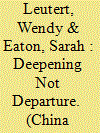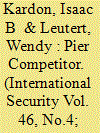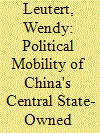|
|
|
Sort Order |
|
|
|
Items / Page
|
|
|
|
|
|
|
| Srl | Item |
| 1 |
ID:
181932


|
|
|
|
|
| Summary/Abstract |
To what extent has governance of China's state-owned economy changed under Xi Jinping? Against the background of momentous shifts in the political arena since 2012, some observe a decisive departure in Xi's approach to managing state-owned enterprises (SOEs): towards tight centralized control by the Chinese Communist Party and away from gradual marketization. Analysing the main aims and methods of SOE governance over the last two decades, we find that SOE policy under Xi exhibits a deepening of pre-existing trends rather than a departure. First, the essential vision of SOE functions articulated under Xi is strikingly consistent with that of his predecessors. Second, his administration's approach to governing SOEs is not novel; it relies on established mechanisms of bureaucratic design, the cadre management system, Party organizations and campaigns. While Xi has amplified Party-centred tools of command and control, this appears to be an incremental rather than a radical shift in approach.
|
|
|
|
|
|
|
|
|
|
|
|
|
|
|
|
| 2 |
ID:
162085


|
|
|
|
|
| Summary/Abstract |
How has the Xi Jinping administration recentralised authority over China’s politics and economy? Studies of Xi’s rule often suggest that his “core leader” status, revolutionary heritage, and informal network of loyalists underpin this consolidation of central control. In contrast, this article focuses on the state sector to highlight how the Xi administration’s recentralisation of authority is grounded in existing governance mechanisms and techniques: central leading small groups, the cadre management system, Party committees, and campaigns. Using policy documents and an original dataset on central state-owned enterprise leaders, I provide evidence that the Xi administration has leveraged each of these four methods to reclaim central authority relative to the preceding Hu Jintao administration. These findings contribute to scholarship on adaptive authoritarian governance and economic reform in China by underscoring that administrations can use existing instruments of central control in divergent ways.
|
|
|
|
|
|
|
|
|
|
|
|
|
|
|
|
| 3 |
ID:
170996


|
|
|
|
|
| Summary/Abstract |
As the Belt and Road Initiative expands the global footprint of Chinese firms, Beijing increasingly relies on international law to protect investments overseas. How and why has China's engagement with the international investment regime evolved over the past four decades? This article addresses these questions by examining the central component of the international investment regime: bilateral investment treaties (BITs). Through analyzing China's BIT practice and the security exceptions in 1,173 BITs concluded by both China as well as its treaty partners, this article provides evidence of changing Chinese engagement, from cautious interaction (1978–1991) to active participation (1992–1997), committed implementation (1998–2012), and mature influence (2013–present). As Beijing accepted, applied, and shaped the rules and norms of the BIT system, China's treaty practice co-evolved with the international investment regime. A co-evolutionary approach illuminates why—and how—state behaviour and international orders change over time.
|
|
|
|
|
|
|
|
|
|
|
|
|
|
|
|
| 4 |
ID:
186182


|
|
|
|
|
| Summary/Abstract |
China is a leader in the global transportation industry, with an especially significant position in ocean ports. A mapping of every ocean port outside of China reveals that Chinese firms own or operate terminal assets in ninety-six ports in fifty-three countries. An original dataset of Chinese firms' overseas port holdings documents the geographic distribution, ownership, and operational characteristics of these ports. What are the international security implications of China's global port expansion? An investigation of Chinese firms' ties to the Party-state reveals multiple mechanisms by which the Chinese leadership may direct the use of commercial port assets for strategic purposes. International port terminals that Chinese firms own and operate already provide dual-use capabilities to the People's Liberation Army during peacetime, establishing logistics and intelligence networks that materially enable China to project power into critical regions worldwide. But this form of networked state power is limited in wartime because it depends on commercial facilities in non-allied states. By providing evidence that overseas bases are not the sole index of global power projection capabilities, findings advance research on the identification and measurement of sources of national power. China's leveraging of PRC firms' transnational commercial port network constitutes an underappreciated but consequential form of state power projection.
|
|
|
|
|
|
|
|
|
|
|
|
|
|
|
|
| 5 |
ID:
159823


|
|
|
|
|
| Summary/Abstract |
Extensive research on the political mobility of Chinese officials at central, provincial, municipal and county levels has yet to fully consider an important group of elites – the leaders of China's core central state-owned enterprises (SOEs). This paper presents the first systematic analysis of their political mobility between 2003 and 2012 using an original biographical dataset with 864 leader-year observations. Under the Hu Jintao administration, these leaders emerged as a distinctive group within China's top political elite: increasingly well-educated but lacking experience beyond state-owned industry, with both lengthening leadership tenures and years of previous work in their companies. Instead of a “revolving door” through which these individuals rotate routinely between state-owned business and the Party-state to positions of successively higher rank, a top executive posting was most often a “one-way exit” to retirement. Of those who advanced politically, virtually all were transferred laterally along three career pathways with little overlap: to other core central SOEs; provinces; and the centre. This paper underscores the theoretical importance of disaggregating types of lateral transfer to research on Chinese officials’ political mobility and the cadre management system.
|
|
|
|
|
|
|
|
|
|
|
|
|
|
|
|
|
|
|
|
|